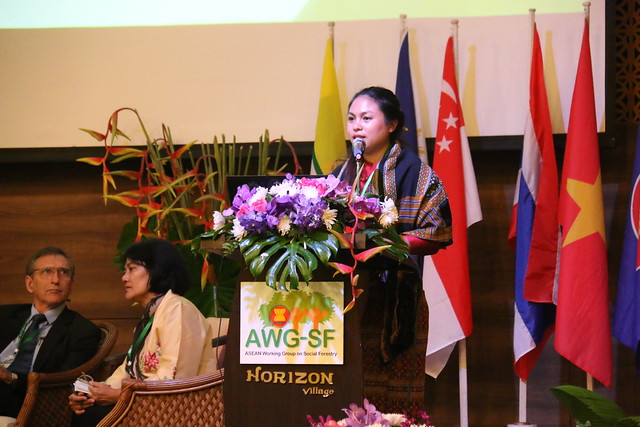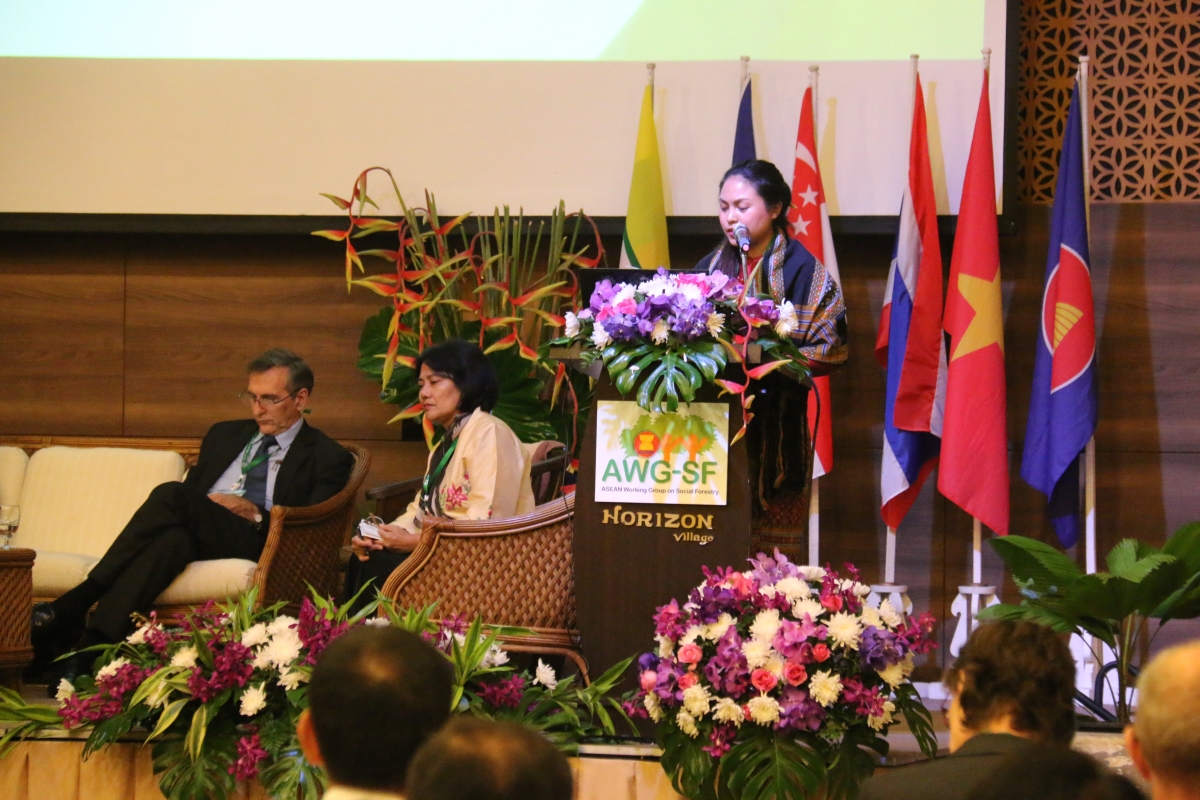CHIANG MAI, Thailand – Over the weekend, civil society organizations from more than 8 countries gathered to hone action plans toward advancing a people-centered social forestry in the region.
The 6th Civil Society Organizations Forum on Social Forestry in ASEAN convened this year to share learnings from the ground and craft advocacy messages on governance mechanisms, forest tenure and access rights, community economy and livelihoods, and safeguards.
Over the years, credit has been given to social forestry’s significant contribution to the achievement of global targets for climate change mitigation and adaptation as well as sustainable forest management. However, achievements achieved at the local, national, and regional levels are still met with critical bottlenecks. The 7th ASEAN Working Group on Social Forestry (AWG-SF) Conference has again opened a space to continue the ongoing dialogue and engagement with Forest Landscape Restoration (FLR) as the central theme.
“Are we pouring old wine into new bottles?” sad Mr. Patrick Durst, Senior Policy Officer of the Food and Agriculture Organization Regional Office for Asia and the Pacific as he presented the concepts and issues around FLR. Among the many approaches, what promise does FLR hold for its stakeholders, most especially indigenous and local communities? The approach is integrative as FLR will bring together various elements of landscape restoration. However, Mr. Durst remarked that FLR cannot succeed without the support and effective involvement of the people. “Far too often in the past, governments have often looked at people as source of cheap labor. If we want to make it work, we have to make it work for the people to equitably benefit from these resources.”
 Photo by Phnom Thano, Inter Mountain People Education and Culture in Thailand
Photo by Phnom Thano, Inter Mountain People Education and Culture in Thailand
The perspective provided by the CSO Forum in the plenary, through Ms. Mai Thin Yu Mon of the Chin Human Rights Organization in Myanmar resonated the very same sentiments: that only through inclusive processes can the success of achieving social forestry and climate change adaptation and mitigation targets be ensured. Find the statement of the CSO Forum in the 7th AWG-SF Conference below.
Civil Society Organizations (CSO) Forum on Social Forestry in ASEAN Statement 7th ASEAN Working Group on Social Forestry (AWG-‐SF) Conference 2017
Background
The CSO Forum on Social Forestry in ASEAN was established in 2012, and is participated in by civil society organizations and community based organizations, indigenous peoples’ networks and membership organizations who are present in ASEAN and are implementing capacity building, awareness raising, and technical support programs on forest and NTFP livelihood and marketing, forest tenure and access rights, and traditional and indigenous knowledge systems on natural resources, and a few projects in REDD+. It is a platform to distil, consolidate and relay key messages from CSOs and communities to ASEAN member states through the ASEAN Working Group onSocialForestry (AWGSF).
This year’s 6th Annual Gathering of the CSO Forum on Social Forestry in ASEAN, was participated by over 60 participants from 40 organizations, from more than 8 countries. Following the development of our CSO Forum vision last year at the 10th Annual Meeting and Policy Dialogue in Palawan, Philippines, and the setting of our goals and targets up to 2020 to contribute to the ASEAN cooperation on forestry, we are pleased to share our update with you.
Social forestry provides significant contribution to global targets for climate change mitigation and adaptation, and is one of the already proven mechanisms to achieve sustainable forest management. Indigenous peoples and local communities are already leading several restoration initiatives in forested landscapes. RECOFTC’s report on the status of social forestry in ASEAN noted that approximately 10M hectares has been allocated as of 2016 which is around 50%of the ASEAN countries’ social forestry target as of that year.
The target for other countries like Indonesia has since been increased which we see as a sign of an expanding commitment to social forestry. The increased target affirms trust in indigenous and local communities as vital stewards of ASEAN forests. We hope that other ASEAN countries may follow suit.
The engagement with the ASEAN Coordinating Committee on Micro, Small and Medium Enterprises (ACCMSME) is ongoing with several marketing events to support community forest enterprises in the region. Relationship between CSOs and ASEAN member states made possible through the facilitation of the ASEAN Swiss Partnership on Social Forestry and Climate Change (ASFCC) has indeed improved and is making vital contribution.
There are key national and subnational developments and let me name a few:
In the Philippines, the Forest Management Bureau together with stakeholders is working towards the establishment of a National Working Group on Social Forestry and Climate Change and has initiated coordination with the Climate Change Commission for linking social forestry and National Determined Contribution (NDC) under the Paris Agreement. It has also opened the door for policy development on non-‐timber forest products. Free and Prior Informed Consent (FPIC) has been strengthened with local governments undergoing FPIC for land use planning, biodiversity conservation activities under their REDD+ readiness and development partners are now requiring certificate of FPIC compliance as precondition for all projects. A Protected Area Management Board in Palawan province recognized the development and protection land use plans of an indigenous community within the protected area.
In Cambodia, FPIC is included in the draft Environmental Impact Assessment law. The carbon credits from REDD+ project was sold and most of the revenues are used to support forest protection and community development through a benefit sharing mechanism Also, the Cambodian King affirms a national climate change response and the need of a common ASEAN Strategy for working on deforestation and non-timber forest products.
In Indonesia, social forestry is part of the Nationally Determine Contribution (NDC) of the country. The Ministry of Environment and Forestry (MoEF) has released new regulation number 83 in 2016 to streamline the process for community forestry application. This regulation is a giant leap to accelerate the expansion of Social Forestry in Indonesia, which has targeted 12.7 million hectares. Government responded to revision of regulations and policies in SF in provincial level. Nine indigenous communities in Indonesia received customary titles to manage their customary forests.
In Laos, Initial advocacy efforts yield the inclusion of communal/collective land titling within the draft revision of the land law. In terms of forest governance, the government is interested in the FLEGT-‐VPA process.
In Malaysia, a process of formulating a 10-‐year consolidated policy for the 3 states – Sabah, Saraak and Peninsular Malaysia within a national framework for social forestry in consultation with communities, CSOs, private sector, among others is being facilitated. In Sabah, the Sabah Social Forestry Working Group has been established. This working group consists of forestry department, indigenous peoples’ organizations and civil society organizations.
In Myanmar, FPIC is included in the National Environmental Impact Assessment stakeholder engagement guidelines and Environmental Policy Framework; There is an ongoing national land use formulation and forest law review;
In Thailand, the government targets to increase forest cover throughout the country by 40% within 10 years from 2014 – 2023. A co-‐management scheme for natural resource management is ongoing and needs to be promoted.
In Vietnam, the terms Indigenous Peoples and Ethnic Minority Group has appeared for the first time in the National REDD+ Action Plan toward 2030 (Decision No.419/QD-‐TTG dated 5th April 2017 by Prime Minister). Other issues, such as environmental -‐ social safeguards, gender, the full and effective participation of Ethnic Minority Groups and local communities have also been addressed in article 1 -‐ Government Perspective of this document.
In the continuing spirit of an ongoing dialogue and engagement to improve upon the critical bottlenecks in social forestry, here are the important aspects where the ASEAN and the ASEAN Member States may offer support:
There is still an absence or weak recognition of tenure of indigenous peoples and local communities conserved areas and territories and their associated traditional knowledge, making forest dependent communities more vulnerable to conflicts due to public and private development projects.
Institutional cooperation and coordination among government bodies implementing and providing support for social forestry activities remain weak, and in most countries unclear.
Despite documented evidence that shifting cultivation in certain conditions is a sustainable forest land management practice, it is yet to be recognized as such in most countries.
The inclusion of FPIC and the increase role of communities in various policies will take time to implement and there is limited capacity for government and other stakeholders to apply these policies. In some countries, there are strong safeguards at the local level but not connected and supported at the national level.
Recommendations
In line with ASEAN Cooperation on Forestry, Key Performance Indicators on Food Agriculture and Forestry, the Strategic Plan of Action of the AWGSF, and the affirmed CSO Forum on Social Forestry Vision and Thematic Goals, Adopted Strategies and Mechanisms from Puerto Princesa, Philippines in 2016, the CSO Forum would like to reiterate the following points that we find fundamental in setting the context of forest landscape restoration in ASEAN under these 4 key themes:
For Forest Tenure and Access Rights
- Support the establishment of co-‐management areas, indigenous peoples and local communities’ conserved areas and territories, and other proven management and governance arrangements in forested landscapes;
- Establish and strengthen a platform in ASEAN/AWG-‐SF on sustained dialogue on rights and access of indigenous peoples and local communities;
- Ensure that indigenous peoples and local communities’ customary tenure rights and access to their forest and farmland including shifting cultivation areas are secured;
- Strictly monitor development instruments to ensure that they all respect existing laws; and
- Provide financial and technical support to indigenous peoples. local communities, and forest and farm producers through operationalizing the ASEAN Social Forestry Trust Fund.
On Safeguards
- Ensure that any forest landscape restoration and management initiative, plans and programs secure FPIC of indigenous peoples under the UN Declaration on the Rights of Indigenous Peoples (UNDRIP) as a minimum ASEAN member states must continue to develop national guidelines on FPIC with the full and effective participation of indigenous peoples.
- Develop and implement national policies that take into account the UN Voluntary Guidelines on the Governance of Tenure (VGGT) and REDD+ Cancun safeguards.
- Ensure the security of communities, CSOs and advocates.
- Ensure that an accessible and effective community grievance mechanism is put in place in ASEAN member states.
On Governance Mechanisms
- Laws that provide for land tenure and resource access, and recognize traditional knowledge and self-‐governance must be created and/or implemented
- Ensure that processes for securing communal land titles are faster, streamlined, and more efficient.
On Community Economy and Livelihoods
- Offer support in creating and strengthening an enabling policy environment and mechanism/s for community forestry enterprises including but not limited to tax exemption for NTFP trade of indigenous peoples and local communities, and assist MSMEs to meet national/regional product standards or requirements, enhance value addition, increase bargaining power and achieve economies of
We affirm and assert that the self-identified and selected members of the CSO Forum, will continue to be open to collaboration and innovative work with governments and other stakeholders, to advance social forestry as an effective mechanism and catalyst, to achieve climate change mitigation and adaptation and forest landscape restoration goals and targets in ASEAN.





